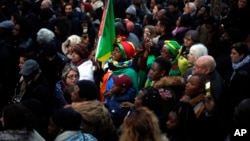The divided country's U.N.-backed administration has carried out attacks since Tuesday against what it labelled "gangs of fuel, narcotics and human traffickers" in and around the western city of Zawiya.
"The security operation will continue until the achievement of its objectives," the Tripoli government said in a statement.
On Monday, the eastern-based parliament denounced the Tripoli government's operation as the "settlement of political scores rather than a fight against traffickers."
Drone strikes killed at least two people and wounded several others Sunday, including the nephew of a legislator from Libya's rival parliament, whose home had reportedly also been hit in strikes three days earlier.
The airstrikes drew criticism Monday from Western embassies in Tripoli, with the United States' mission calling for "de-escalation" and the safeguarding of civilians, and Britain branding the use of such weapons in civilian areas "unacceptable."
But the Tripoli government defended the strikes, saying it had "successfully" completed the first phase of its operation and called on civilians to "cooperate with the armed forces and to move away from suspicious sites."
"Seven migrant smuggling boats, six drug trafficking depots... and nine tanker trucks used for fuel smuggling" had been destroyed, it said, adding that the operation would now enter a "new phase."
Libya is split between the U.N.-backed government of interim Prime Minister Abdulhamid Dbeibah, based in Tripoli, and another administration based in the east and backed by military strongman Khalifa Haftar.
The oil-rich country was plunged into years of chaos after a NATO-backed uprising toppled and killed strongman Moammar Kadhafi in 2011.
Armed groups have exploited the turmoil to fund their activities through fuel smuggling and the illegal trafficking of migrants.












Forum